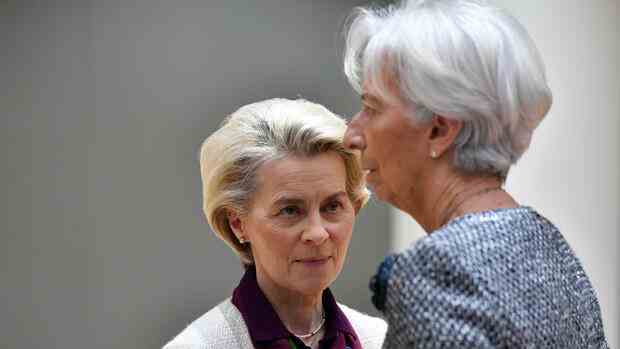Brussels Before the weekend, the banking crisis returned with force. Above all, massive price losses at Deutsche Bank, whose shares lost 15 percent at times, fueled fears that the turbulence would spread. But the prices of other European banks were also clearly in the red, a signal that the crisis after the emergency takeover of Credit Suisse by Swiss competitor UBS is not over yet.
The heads of government gathered in Brussels for the EU summit tried to calm things down. “There is no reason to worry about anything,” announced Chancellor Olaf Scholz (SPD) on Friday afternoon. Deutsche Bank has overhauled its business model in recent years and is a very profitable company.
The Dutch Prime Minister Mark Rutte also said: “We are in good shape.” The banking sector is safe and supervision is strict enough. French President Emmanuel Macron blamed speculators for the price losses.
The President of the European Central Bank (ECB), Christine Lagarde, had previously assured the heads of government what she had already said in the European Parliament earlier this week: the banks had more than enough capital and liquidity. In their final statement, the heads of government then reiterated the phrase Lagarde has been using all week: “Our banking sector is resilient.”
Europe is different from the USA – politicians and supervisors have been trying to calm the markets with this message for days. They portray the bankruptcy of the Silicon Valley Bank in the USA and the emergency rescue of Credit Suisse as special cases. The EU, it is hoped, will get away with it.
>> Read here: Lost credit – Why the banking crises don’t end
In any case, there is no acute need for action in Brussels and the other capitals. The urge to regulate the industry much more strictly now is low. The three EU institutions (Commission, Parliament and Council of the Member States) want to be content with the reforms that have already been planned.
Two legislative packages in the works
The first thing to be decided is the “banking package” by the end of June. The aim is to apply the capital requirements agreed in the Basel Committee to Europe. However, instead of fully implementing the internationally agreed recommendations, the proposals of the three EU institutions are full of exceptions and transitional periods. The package should not be changed radically.
At a “Politico” conference on Thursday, EU Economic Commissioner Paolo Gentiloni warned that the banks should not be “over-regulated” now. Finance Commissioner Mairead McGuinness justified the Commission’s draft as “adequate for the purpose” despite all the exceptions.
The responsible rapporteur in the European Parliament, Jonás Fernández, emphasized that the pressure on the banks had to be maintained. But he also signaled that he was ready to finalize the package quickly.
There is no reason to worry about anything. Chancellor Olaf Scholz
The situation is similar with the second legislative package intended to deepen the banking union. After the financial crisis of 2008, the Europeans established a common bank supervisory authority and a common bank resolution authority. The third pillar should actually be a joint deposit insurance scheme.
Deepening of the banking union controversial
Last summer, however, the idea of joint liability for bank deposits failed in the euro group – mainly due to German resistance. As a result, the finance ministers commissioned the Commission to propose a few minor improvements to the banking union. In April, Finance Commissioner McGuinness wants to present a corresponding legislative package (“Crisis Mechanism and Deposit Insurance Framework Review”, CMDI).
Its aim is to standardize the rules for national deposit insurance. In addition, it should be possible to use the financial resources in the national funds to prevent bank failures, and not afterwards to compensate savers. The European supervisors should also play a greater role in bank resolution.
>> Read here all current developments regarding the banking crisis
Even this increase in power for Brussels is controversial in the member states, because the European banking landscape is very different – as are national ideas about when a bank should be rescued or wound up. It is therefore expected in Brussels that the negotiations will drag on into the next legislative period after the 2024 European elections.
Experts call for far-reaching reforms
Eurogroup boss Paschal Donohoe said on Friday that it is now a question of implementing what the Eurogroup has already decided. The planned reforms could make a difference.
For many experts, this does not go far enough. They call for real reforms – from higher capital buffers to the separation of retail banking and investment banking. Pablo Hernández de Cos, chairman of the Basel Committee on Banking Supervision, called this week for the rules for shadow banks to be tightened. This includes hedge funds and private equity firms, which are less strictly regulated than banks but manage so much capital that they too can pose systemic risk.
Economist Hans-Werner Sinn says in the Handelsblatt that Europe must end “casino capitalism” and increase banks’ equity buffers. The financial experts from the citizens’ movement Finanzwende or the organization Finance Watch argue similarly. They call for banks to fully implement the Basel recommendations. The chief banking supervisor of the ECB, Andrea Enria, also warned this week to deviate as little as possible from the Basel capital requirements.
So far, the critics have not been heard. Politicians like Scholz and Macron want to avoid any impression that there is anything wrong with the banking system.
More: Deutsche Bank shares plummet in double digits
